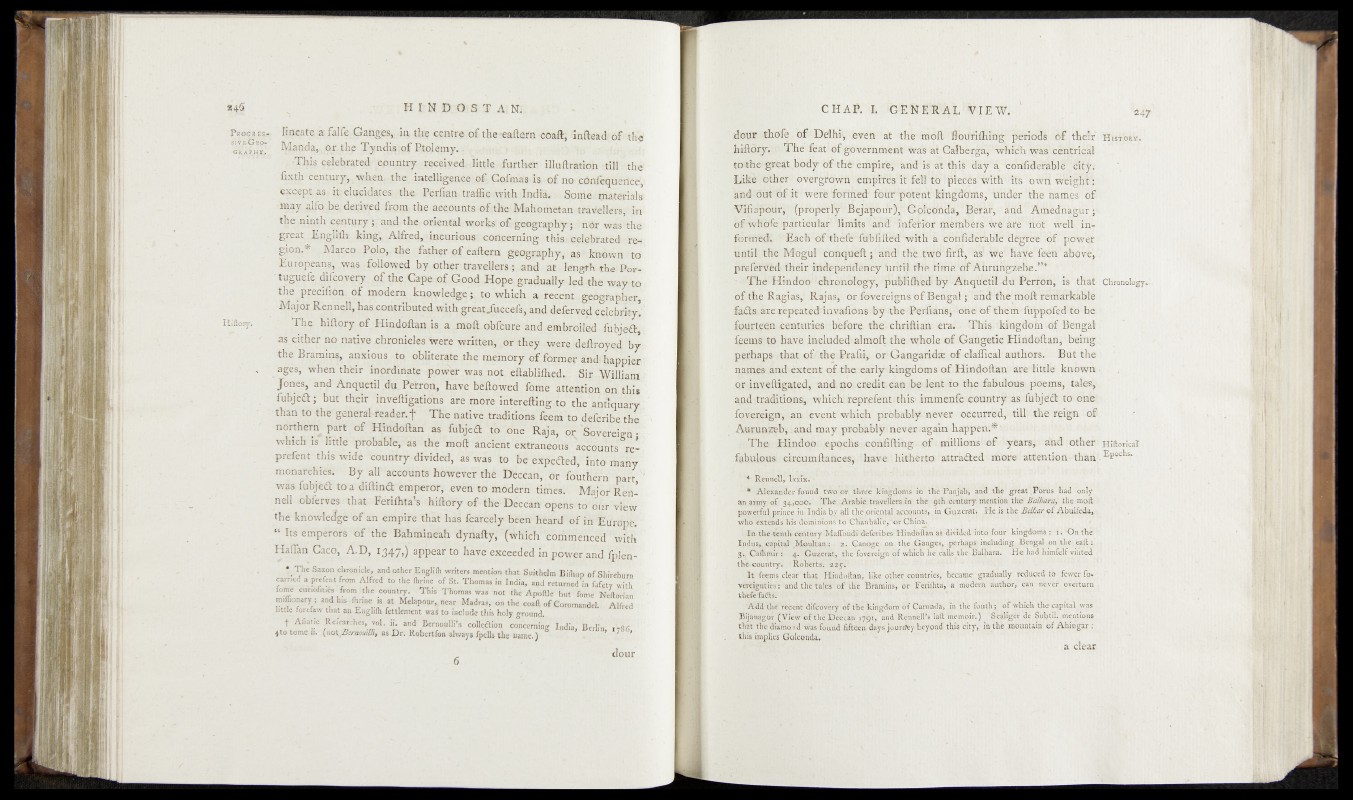
the infteadiof- .thé
Marxda,, or the Tyndisjof Ptolemy.. ,r
- This celebrated cpuntry received little further illuftration till thev
%kh century, when, the intelligencei of; Cofmas is. o£ no ponfequerice,.
except as. it-elucidates the Perlian traffic .with India. • Some, materials
-may alio be- derived from. the accounts of the Mahometan travellers, in
the ninth century ; and the Oriental works' of- geography ; ndr wasthe
Sieat Engïifli hing, Alfred, incurious- concerning this celebrated régi011*
, Marco Polo, the father of eaftern geography, as . knôwn to
Eur^pean.s, was, followed by other travellers j and at length the* l?or-
tuguefe tUfcoyeiy. of the Cape«o£.Good Hope gradually led the w*y to
the precision. of modern knowledge to which. a recent ..gppgfapW
Major Rennell, has contributed with greatjuccefs, and deferyetl celebrity!
The hiftory of Hindoftan is a moft obfeure and embroiled-ftibjçâ,
as either no native xhronicles were written, or'they .were-deftro-yed- by
theBramins, anxious to obliterate the memory of former and^&ppjer
âgés,- when thHr inordinate power was not eftablffhed... SiE William
Jones, and Anquetil dy. Petron, have bellowed fome atteafipq on .this
fiihjèâ; ; but their ihveftigatiohs are more iiiterefting.to the anüquary
than to the genenforeader.f The native traditions feem’to'deforce the
northern part of Hindoftan as fubjed tb one’ Raja; or''Sovereign •
which is little .probable, as the moft ancient extraneous Vcroums re!
prefent this wide country divided, as was to be expefled, into many
monarchies. By all accounts however the Deccan, or fouthèrn part
was fübjta. to a diftina emperor, .even to modern times. j Major Ren-
nell 'öbferves that Fdriffita’-s hiftory of the Deccan opens to' our view
the knowledge of an empire that has fcarcely been heard of in Europe.
“ Its emperors of the Bahmineah dynafty, (which commenced" with
Halfan Caco, A.D, 1347,) appear to have exceeded in power and fplen-
* The Saxon chronicle, and other Englifh writers mention that Suithelm Bifliop. ùf Shirebu
carried a prefent from Alfred to the Ihrine of St. Thomas in India, and returned in fafetv with
fome curiofitiés from the country. This Thomas was not the Apollle but fome' Neftorian
miffionary ; and ^ r (hrine is at Melapour,, near Madras, on the coaft of Coromandel. Alfred
little lorelaw that an Englilh fettlement was to include this holy ground.
- + Afiaî.'c Rematches, vol. in and- Bernoulli’s colleilion concerning India, Berlin ihÉb !
4-to tome ft. {aot ficrnouilli, as Dr. Robertfon always fpclls the name.) . ■■■*. *?#£{
dour
dour thofe of Delhi', even at »the- moft flbifrl thing periods of their -Histoxy.
Eiftdfy» >■ Gsiber^af W^sic^fricistl
tofthe great body of the,jempire, hhiHsf at this day(,a 'Coriliderable ti{y;
Like other- overgrown- etopift,s^itIfeiTTb,ipiecCs<with ifA"bAm WeigMf:
and'-dht‘6f its“%ere fbnrhed' fodP^oteut krngffifms, Under‘the bathes of-
Vifiapourj'-”(properly Bejapour)'*'5 Go1'cqnd&J, ‘ Berar, a'qd demednagur ;
of wHofe partit'u!larnlimlts ‘'anti mfetfer ffiemrers'!we Are motf well informed.
Each pf^hefe fubhfted. with a confidefable1 degreepfkpower
until the Mogul' eonqiibft j/’and^ the tW6* firft,"its We^ffave i<#£h"above1, f
preferred fheir inbegerldericy imtfi tSife dlrre -of'Abrhiigzehe.”'4
r • The Hindoo"chronology’, puhlifhecf by'Ahqu^tfl dtl PferrOn, isfj that Chronology*,
of the Ragias,' Rajas, or fovereigns-of Bengalpater fhe'moft remarkable
facts, airerepeatteiPirrM&fen’s-by ithe tPerfiArfSf'iobAof thehv fiij^dled'fo’be.-
fourteen ii^ilagStisei ibkfbj^ th# chriftiaai; eish :■ TMs, 1 kmgdbin td€ Btnghi f
to bavElhcffided^lmoftthe whole®#Gahgetid-Hindbftaflj-i^Wg1 ;
p^hag® ith«te.ofdtbe.Prafil^ or*Gangaridm pf claffical' authors; But the
saiftfs; tod; extftaifc tee little • known >.
Qrjnveftigated, and no cEedib<an sbedemtito riielfabvdOu|,poet£is, talfesi4 .
: which: cepip|Sit(thi& immenfe.P®utttr^aSj&bjd^ ,tbvbkbf
ffysifigu^Hahvv^t^EwluA prlibahl^’uever- -'-dw
^utupssehiiand may probablyine^ferfagaiaha^Sekt^hMi
iitThei Hiudoor^epochs.scokfift&igi; of .,millions f®# 'yfearsi ahd otheri-Hiftorkal
fabulous: ciraumftancesy! have ! hitb&rps attrailed* more I attention • t-han f EP^ch^-
*4. RjniieHy- ’
* Alexander found two or three hfiigdonis in the Panjab, and .the great ;Porus had only '
an, aimjsiofj .34^066.;■ The .Aiabicltravellers in tljf\ 9th eentury: mention the' Balhara, the moil -
poweiftyl prince,in India by all the priental apdoupts, in Guzerati He s the B'elhar of Ajsulfeda,
who extends his ilominioris ,to CKinbalic, "or China.
In tlieHenthice'nth^'iMalfdudi'’deferibes Hintfeftan as divided i'ritprfouir kingdoms : 1. On the
Indu^K: eiipital Moukan : z. Canoge on the ...Ganges, pjeiiha^spncluding Bengal on the eaft: ■
3. Caflimir: 4. Gnzerat, the fdyereign'of which lie.calls, the Balhara. He had lilmfclf vilxted -
the- country. Roberts. 225.
It fee ms clear'that Hfndoftan, like other countries, became', gradually reduced to fewer fo- >'
vereignties: and the tales o f the Bramins, or Feriftita, a modern author, can never oVertum
thefe-fafts'.' 1 -
Add the' recent difcd'iiery of the kingdom' of Carnada, fn’thc fduth'j' of which the capital was'
Bijanagur (View of the'Heccan 1791, and Reniiell’ s lad memoir.) Scaliger de Subtil, mentions
that the diaihoad Was found fifteeivdays 'jburikyAeyohd tiiiS city, of Ahingar :
this implies Golconda.
a .clear